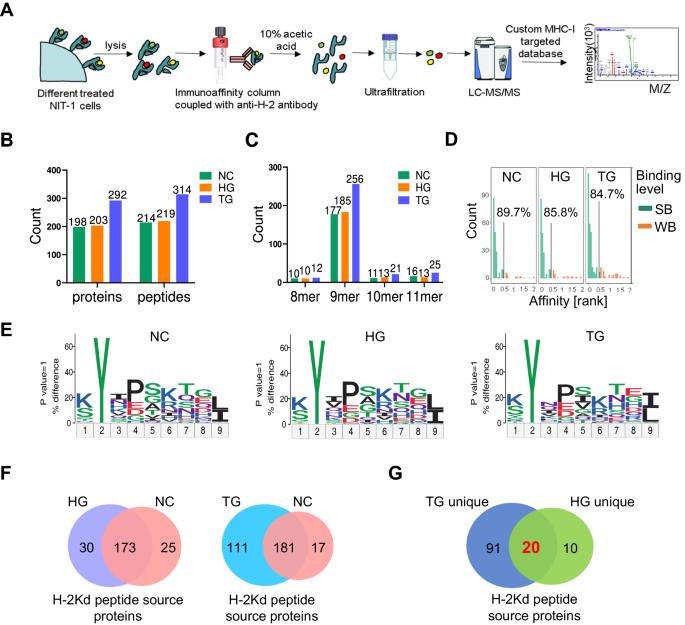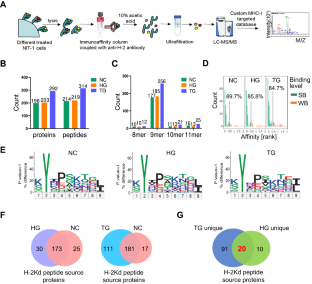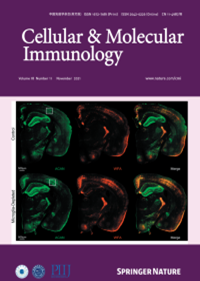Immunopeptidome mining reveals a novel ERS-induced target in T1D
IF 21.8
1区 医学
Q1 IMMUNOLOGY
引用次数: 0
Abstract
Autoreactive CD8+ T cells play a key role in type 1 diabetes (T1D), but the antigen spectrum that activates autoreactive CD8+ T cells remains unclear. Endoplasmic reticulum stress (ERS) has been implicated in β-cell autoantigen generation. Here, we analyzed the major histocompatibility complex class I (MHC-I)-associated immunopeptidome (MIP) of islet β-cells under steady and ERS conditions and found that ERS reshaped the MIP of β-cells and promoted the MHC-I presentation of a panel of conventional self-peptides. Among them, OTUB258-66 showed immunodominance, and the corresponding autoreactive CD8+ T cells were diabetogenic in nonobese diabetic (NOD) mice. High glucose intake upregulated pancreatic OTUB2 expression and amplified the OTUB258-66-specific CD8+ T-cell response in NOD mice. Repeated OTUB258-66 administration significantly reduced the incidence of T1D in NOD mice. Interestingly, peripheral blood mononuclear cells (PBMCs) from patients with T1D, but not from healthy controls, showed a positive IFN-γ response to human OTUB2 peptides. This study provides not only a new explanation for the role of ERS in promoting β-cell-targeted autoimmunity but also a potential target for the prevention and treatment of T1D. The data are available via ProteomeXchange with the identifier PXD041227.


免疫肽组挖掘揭示 T1D 中 ERS 诱导的新靶点
自反应性 CD8+ T 细胞在 1 型糖尿病(T1D)中起着关键作用,但激活自反应性 CD8+ T 细胞的抗原谱仍不清楚。内质网应激(ERS)与β细胞自身抗原的产生有关。在这里,我们分析了胰岛β细胞在稳定和ERS条件下的主要组织相容性复合体I类(MHC-I)相关免疫肽组(MIP),发现ERS重塑了β细胞的MIP,促进了一组常规自身肽的MHC-I呈现。其中,OTUB258-66表现出免疫优势,相应的自反应CD8+ T细胞对非肥胖糖尿病(NOD)小鼠具有致糖尿病作用。高糖摄入会上调胰腺 OTUB2 的表达,并增强 NOD 小鼠对 OTUB258-66 特异性 CD8+ T 细胞的反应。重复给药 OTUB258-66 能显著降低 NOD 小鼠 T1D 的发病率。有趣的是,T1D 患者的外周血单核细胞(PBMCs)对人 OTUB2 肽的 IFN-γ 反应呈阳性,而健康对照组则没有。这项研究不仅为 ERS 在促进以 β 细胞为靶点的自身免疫中的作用提供了新的解释,还为预防和治疗 T1D 提供了潜在的靶点。这些数据可通过蛋白质组交换(ProteomeXchange)获得,其标识符为 PXD041227。
本文章由计算机程序翻译,如有差异,请以英文原文为准。
求助全文
约1分钟内获得全文
求助全文
来源期刊
CiteScore
31.20
自引率
1.20%
发文量
903
审稿时长
1 months
期刊介绍:
Cellular & Molecular Immunology, a monthly journal from the Chinese Society of Immunology and the University of Science and Technology of China, serves as a comprehensive platform covering both basic immunology research and clinical applications. The journal publishes a variety of article types, including Articles, Review Articles, Mini Reviews, and Short Communications, focusing on diverse aspects of cellular and molecular immunology.

 求助内容:
求助内容: 应助结果提醒方式:
应助结果提醒方式:


